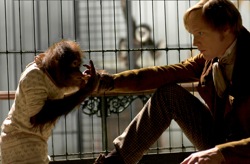
Charles Darwin’s 1859 book On the Origins of Species was a breakthrough scientific text that presented concrete evidence on the theories of evolution. While Darwin’s research and writing of the book are at the centre of Creation, the film is mainly concerned with Darwin’s private life and his inner struggles coming to grips with what his research will mean to society and his family. As one supporter enthusiastically tells him, “You have killed God” and yet Darwin is portrayed as man wrestling with the implications of God not being real, coming to terms with his own loss of faith and trying to re-connect with his religious wife. Far from being a conventional biopic of a famous historical figure, Creation is an emotionally complex film that examines faith, love, grief and passion through the key events that propelled Darwin to finish one of the most important books ever written.
In order to avoid the usual narrative trappings of biopics (the rise then fall then rise again of the protagonist) Creation is non-lineal, cutting predominantly between two distinctly different phases in Darwin’s life while incorporating his various stories about the natural world and humanity’s attempts to understand it. The younger version of Darwin in the film is a happy and enthusiastic man who loves his family. The later version of Darwin is a sickly man who is consumed by his work. Inter-cutting between the two time periods means that we get an even mixture of the curious and warm younger Darwin with the tired and distant older Darwin. While the incident that has caused this change in him is strategically hidden until towards the end, it is slowly made apparent rather than suddenly revealed, giving the film a significant degree of restraint and credibility for treating the audience with intelligence.

Paul Bettany gives an outstanding performance as Darwin, conveying the mental anguish that Darwin suffered over what he was doing. He comes across as a complex figure who on the one hand develops an understanding of how similar humans are to the animal kingdom, allowing him considerable empathy towards animals, but he has no problem raising birds to simply kill them for his various studies. He feels compelled to challenge the authority of the church and yet recognises its social value. As his wife Emma Darwin, Jennifer Connelly initially comes across simply as a disapproving and uptight obstacle but as the film evolves her character is more fleshed out. The strain that her and Darwin’s differing attitudes toward religion put on their relationship is a moving component of the overall film.
Creation does not present a comprehensive history of the life and times of Charles Darwin. Instead, it gives an impression of the emotional, intellectual and spiritual mechanisms of his mind and how it all impacted upon his work and his family. There are scenes where the audience looks through his eyes to see the natural world at work, with its endless cycle of life, death and decay. These sequences are disturbing, captivating and strangely beautiful. The real highlights are the stories that Darwin tells to his daughter Annie, especially the incredibly sad story of Jenny the orangutan. Told across two sequences, it is a story that really expresses the humanity that inspired Darwin to do what he did and it is this humanity that is the focus of Creation.
![]()

I found the battle between science and religion to be very poignant with Charles being pushed and pulled by both sides.
His guilt from exposing the ignorance of certain aspects of religious teachings was very moving.